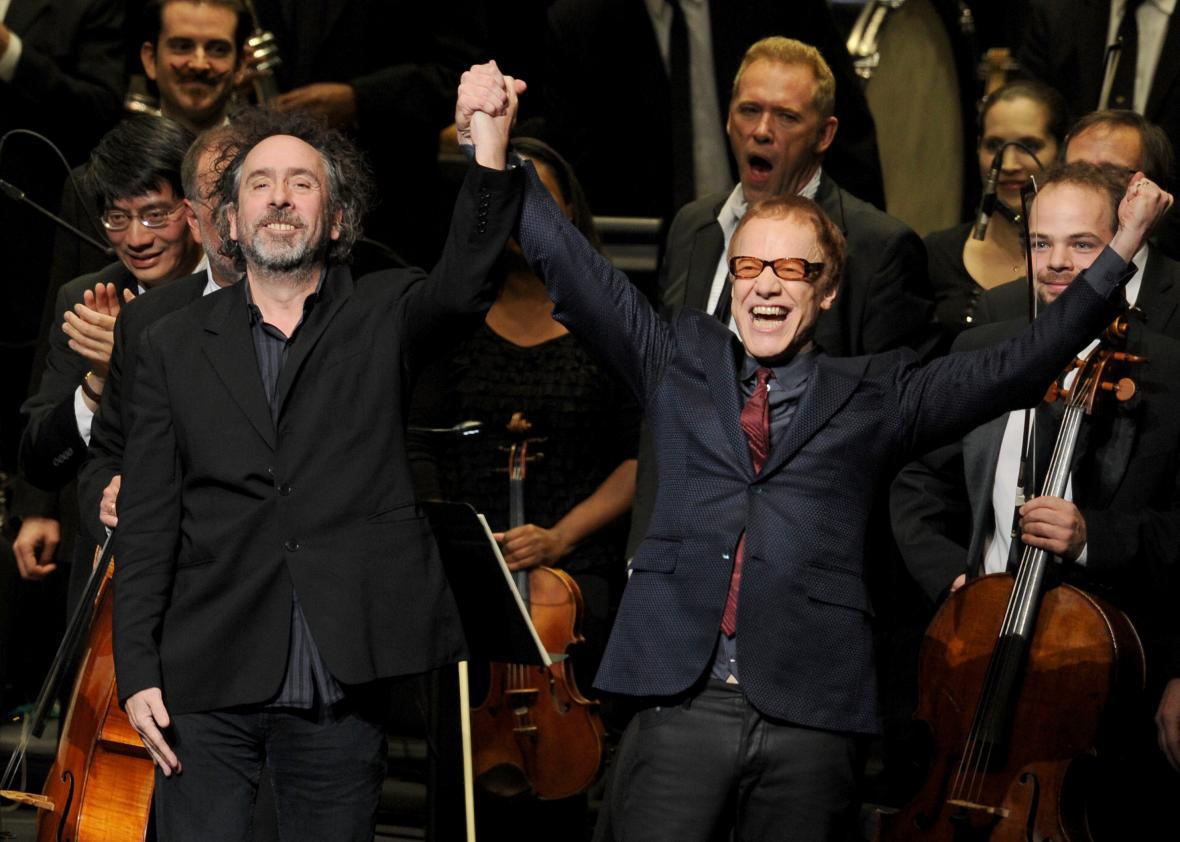The relationship between a film composer and a director—especially when it works well, developing and deepening over the course of a career—is a fascinating thing. In many cases, it falls to the score to bring a director’s vision, particularly its emotional dimension, to life. While the music itself may be as atonal as a cat in heat and still work beautifully, dissonance between a composer and filmmaker can spell disaster. But when the two are in harmony, the results can be transcendent. Take John Williams and Steven Spielberg, or Ennio Morricone and Giuseppe Tornatore. But the most effective paring of all time has to be Danny Elfman and Tim Burton.
Elfman and Burton have worked together on films ranging from Edward Scissorhands and The Nightmare Before Christmas to Big Fish and Corpse Bride. But their synergy has never been more apparent than at a special concert surveying three decades of their output. In Danny Elfman’s Music from the Films of Tim Burton, a full battery of orchestra, choir, and soloists lead by conductor John Maurceri (and assisted by a giddy Elfman for the Nightmare vocals) careens through Elfman’s jangly scores, beginning with Charlie and the Chocolate Factory (aka the best main titles ever), reaching a climax with the dark grandeur of Batman and Batman Returns, and exiting the rabbit hole with the swirling buoyancy of Alice in Wonderland, all the while accompanied by clips from the films—and, better still, Burton’s own bewitching storyboard sketches. Originally premiering in London in 2013 before moving on to Los Angles, and currently playing in New York as part of the Lincoln Center Festival, the concert offers a spectacular seminar on just how in tune two artists can be—even when the work they create is famously off-key.
Like many film composers, Elfman has a discernible (and, to my ear, addictive) sound: He favors minor keys and harmonic progressions involving the disconcerting Neapolitan 6 chord. His rhythms are propulsive and hypnotic (percussionists feature prominently in his scores, which partially explains my fandom), his brass writing badass, and he often works in layers, especially by draping a languorous melody over a roiling undercurrent. Burton, likewise, has a well-defined aesthetic: a sort of dreamy, gothic whimsicality wafting out from the imagination of a peculiar child. Mix these two together, and you’ve got the stuff from which worlds are built.
But the simpatico goes deeper than just “dark”—indeed, showcasing all this material together reveals the profound ways in which Burton and Elfman complement one another. Take the structural predilection I mentioned before, the way Elfman places fainting couch tunes precariously on the edge of wave-battered cliffs. So many of Burton’s stories are about an innocent figure moving naively through a foreboding or threatening situation. Elfman’s writing echoes this juxtaposition, introducing a powerful tension. We want the melodies, like the characters, to pay attention! That said, for all this duo’s ability to conjure shadows, they also excel at creating sweet dapples of light, such as in Frankenweenie and Big Fish. Rare is the team that can make that shift so convincingly. (The pair’s next project together is a film with the promising title Miss Peregrine’s Home for Peculiar Children, due out in spring of 2016.)
The decision to pair Elfman’s music with Burton’s drawings was particularly instructive. When I think of the latter’s visual aesthetic, my mind immediately recalls the fireplace from the wedding scene in Beetlejuice, which morphs from the normal rectangle into a deranged trapezoid as the ceremony begins.
In Burton’s universe, polygons are always irregular, faces typically elongated, and lines never straight—his sketches bear this out even better than his set design. Amazingly, Elfman’s music manages to follow the same contours, favoring disjunct leaps, metrical drunkenness, gut-turning swoops, and hairpin turns over anything stately or predictable. Basking in both the music and the images, you realize Burton and Elfman share not only a tone, but also a shape—a vision of the world that’s usually akimbo, certainly never square.
For those in or around New York, Danny Elfman’s Music from the Films of Tim Burton runs through July 12 at Lincoln Center.
